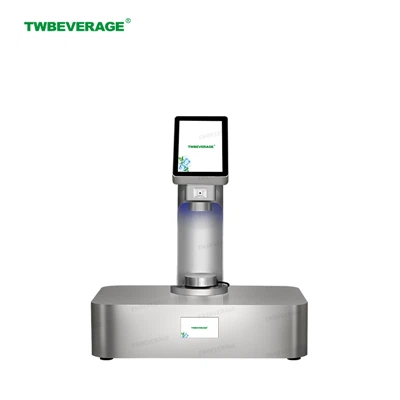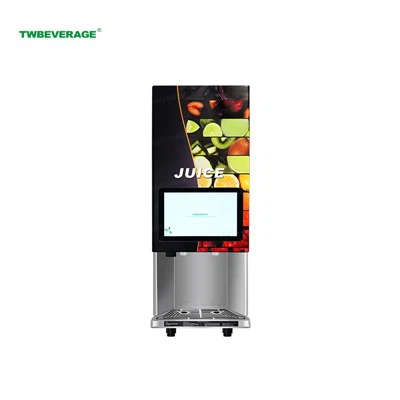Hey there! As a supplier of commercial juice dispensers, I often get asked a bunch of questions from folks in the food and beverage industry. One question that pops up frequently is, "Can I use carbonated drinks in a commercial juice dispenser?" Well, let's dig into this topic and break it down.
First off, let's understand what a commercial juice dispenser is. These machines are designed mainly for dispensing fresh or pre - made fruit juices. We've got different types, like the Cold Drink Juice Machine, the Automatic Juice Dispenser Machine, and the Chilled Juice Dispenser. They're built to handle the consistency and properties of regular juices, which are mostly non - carbonated.
Carbonated drinks, on the other hand, are a whole different ballgame. They contain dissolved carbon dioxide gas, which creates those fizzy bubbles we all love. This gas gives carbonated drinks their characteristic fizz and a bit of pressure. When you open a can or bottle of soda, you can hear the hiss, right? That's the carbon dioxide escaping.
Now, the big question: Can you use carbonated drinks in a commercial juice dispenser? The short answer is, it depends.
The problems with using carbonated drinks in a juice dispenser
Pressure issues
Most commercial juice dispensers aren't built to handle the pressure that comes with carbonated drinks. Carbonated beverages have an internal pressure due to the dissolved carbon dioxide. If you try to put them in a standard juice dispenser, the pressure can cause all sorts of problems. It might lead to leaks around the seals of the dispenser. You could end up with a messy situation, with soda spraying out everywhere. And over time, the constant pressure can damage the internal components of the machine, like the valves and pumps. These parts are designed for the low - pressure environment of non - carbonated juices, and the extra stress from carbonated drinks can make them wear out much faster.


Foaming problems
Carbonated drinks tend to foam a lot, especially when they're agitated. When you dispense a carbonated drink from a dispenser, the flow and movement of the liquid can cause excessive foaming. This foam can clog the dispenser's nozzles and tubes. If the nozzles get clogged, the dispenser won't work properly, and you'll have a hard time getting a clean pour. Plus, the foam can make it difficult to measure the correct amount of the drink, which is a big deal in a commercial setting where you want to control portion sizes.
Corrosion and damage
Some carbonated drinks are acidic. For example, cola drinks have a relatively low pH level. This acidity can corrode the internal parts of the juice dispenser. Over time, the metal components, like the pipes and connectors, can start to rust or deteriorate. This not only affects the performance of the machine but can also contaminate the drinks. No one wants to drink a soda that's been in contact with rusty parts!
When it might work
Specialized dispensers
There are some commercial juice dispensers that are designed to handle carbonated drinks. These specialized machines are built with stronger seals and pressure - resistant components. They're also designed to manage the foaming issue. For example, they might have special nozzles or flow control systems that reduce foaming during dispensing. If you're really set on using carbonated drinks in a dispenser, you should look into these specialized models.
Modified dispensers
In some cases, it might be possible to modify a standard juice dispenser to handle carbonated drinks. However, this is not a DIY project. You need to have a professional technician do the modifications. They'll know how to reinforce the seals, upgrade the valves, and make other necessary changes to make the dispenser suitable for carbonated beverages. But keep in mind that modifying a dispenser might void its warranty, and there's still no guarantee that it will work perfectly in the long run.
What to consider if you're thinking about it
Cost
If you decide to go for a specialized dispenser, it will likely cost more than a standard juice dispenser. Specialized machines have more advanced features and components, which drive up the price. And if you choose to modify a standard dispenser, the cost of the modifications can also be significant. You need to factor in these costs and see if it makes financial sense for your business.
Maintenance
Using carbonated drinks in a dispenser will require more maintenance. You'll need to clean the dispenser more frequently to prevent foaming and corrosion issues. You might also need to replace parts more often due to the extra wear and tear. Make sure you have the time and resources to keep up with the maintenance.
Customer demand
Before you make any decisions, think about your customer demand. If your customers mainly want non - carbonated juices, there's no real need to use carbonated drinks in the dispenser. But if there's a high demand for carbonated beverages, then it might be worth exploring the options.
In conclusion, while it's possible to use carbonated drinks in a commercial juice dispenser, it's not without its challenges. You need to carefully weigh the pros and cons. If you're unsure, I'd recommend consulting with an expert in the field.
If you're interested in our commercial juice dispensers, whether it's for non - carbonated juices or you're looking for a specialized model for carbonated drinks, we'd love to talk to you. We can help you find the right dispenser for your needs and answer any other questions you might have. Just reach out, and we'll start the conversation about how we can meet your commercial beverage dispensing requirements.
References
- Beverage Industry Handbook: Covers general information about carbonated and non - carbonated drinks and their properties.
- Commercial Food Service Equipment Manuals: Provide details on the design and limitations of commercial juice dispensers.






